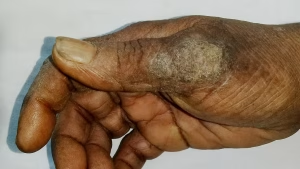
Deal with Ringworms
Ringworms can be a frustrating and potentially damaging condition, especially when they affect the scalp and hair. Early detection and treatment are essential to prevent further complications.
In this blog, we will discuss what ringworms are, their symptoms, causes, and effective treatment options, ensuring you have the knowledge to tackle this issue before it escalates.
Understanding Ringworms
Ringworms, despite the name, are not actually worms. They are fungal infections caused by a group of fungi known as dermatophytes.
These fungi thrive in warm, moist environments, making the scalp and hair a potential target. The term “ringworm” originates from the circular, ring-like rash that often appears on the skin.
Common Ringworm Symptoms
Identifying the symptoms early can help you manage ringworms effectively. Here are some common ringworm symptoms to look out for:
- Itching and Irritation
An intense itching sensation on the scalp is often one of the first signs of ringworms. This can lead to scratching, which may worsen the condition. - Red, Circular Patches
You may notice red, scaly patches on the scalp. These can resemble rings, leading to the name “ringworm.” - Bald Spots
As the infection progresses, it can cause hair loss in affected areas, resulting in bald spots. - Flaky Skin
The affected area may become flaky and develop a scaly texture. - Pain and Swelling
In more severe cases, the scalp can become painful and swollen, indicating a more advanced infection.
What Causes Ringworms?
Understanding the ringworm causes can help you prevent future infections. They are primarily caused by:
- Fungal Infections: Dermatophytes thrive in warm and humid environments, leading to infections on the skin and scalp.
- Close Contact: Ringworms can spread through direct skin-to-skin contact with an infected person or animal.
- Contaminated Objects: Sharing personal items like hats, brushes, or towels can facilitate the spread of ringworms.
Is Ringworm Contagious?
One common question people ask is, “Is ringworm contagious?” Yes, ringworms are indeed contagious. They can spread through direct contact with infected individuals, animals, or contaminated surfaces. Therefore, it is crucial to maintain good hygiene and avoid sharing personal items.
How to Identify Ringworms on the Scalp
Identifying ringworms early can prevent complications. Here’s how to recognize ringworms on skin or the scalp:
- Ringworm Stages Pictures
Examining ringworm stages pictures can help you understand how the infection progresses. Initially, you might see small, red spots that gradually form into larger, circular patches. - Observation
Regularly check your scalp for any changes, especially if you experience itching or irritation. - Consultation
If you suspect having them, consult a healthcare professional for a proper diagnosis and treatment plan.

Effective Ringworm Treatment Options
Once you’ve identified ringworms, prompt treatment is essential. Here are some effective ringworm treatment options:
Over-the-Counter Treatments
- Antifungal Creams
Over-the-counter antifungal creams can effectively treat mild cases of ringworms. Look for ingredients like clotrimazole or miconazole. - Medicated Shampoos
For ringworms affecting the scalp, medicated shampoos containing ketoconazole or selenium sulfide can help eliminate the fungus.
Prescription Medications
In more severe cases, your doctor may prescribe:
- Oral Antifungal Medications
For extensive or stubborn infections, oral antifungal medications may be necessary. These drugs target the fungal infection from within. - Topical Prescription Treatments
Stronger topical treatments may be prescribed for localized infections, particularly on the scalp.
Home Remedies
Some home remedies can also complement traditional treatments:
- Tea Tree Oil
Known for its antifungal properties, tea tree oil can be applied topically to affected areas. - Apple Cider Vinegar
Diluted apple cider vinegar may help alleviate symptoms and has antifungal effects.
Importance of Completing Treatment
Regardless of the treatment method you choose, it is crucial to complete the entire course of medication. Stopping treatment early can lead to recurrence or worsening of the infection.
Preventing Ringworms
Taking preventive measures can significantly reduce your risk of ringworms. Here are some strategies:
- Practice Good Hygiene
Regularly wash your hair and scalp, and keep your personal items clean to avoid contamination. - Avoid Sharing Personal Items
Do not share hats, combs, or towels to minimize the risk of spreading ringworms. - Stay Dry
Keep your scalp and skin dry, as fungi thrive in moist environments. - Monitor Pets
Pets can carry ringworms, so check them regularly and seek veterinary care if you notice any signs of infection.
Conclusion
Dealing with ringworms before they cause trouble on our head and hair is crucial for maintaining scalp health and preventing further complications. By understanding the ringworm symptoms, causes, and treatment options, you can take proactive steps to address this issue effectively. Remember, early detection and appropriate treatment are key to keeping your scalp healthy and free from infections.
If you suspect you have ringworms, don’t hesitate to consult a healthcare professional for advice tailored to your situation. With the right approach, you can manage them effectively and prevent them from becoming a more significant problem.





